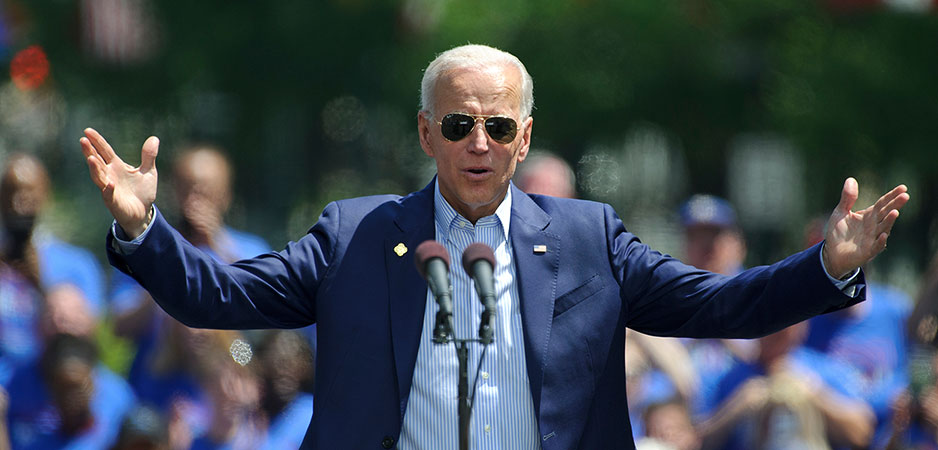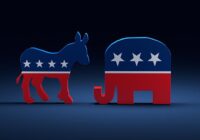Expected to be the leading Democratic candidate for president, it has now been confirmed that, according to the nearly complete reported results, former Vice President Joe Biden has landed with a thud in a “distant fourth place.” For the past year, he had been cast in the role of the candidate pre-ordained by the party to assume the mantle of defender of the Democratic Party’s faith, by virtue of being the heir to Barack Obama’s throne.
After analyzing the results, the various media seem to resonate with the words of the ghost of Hamlet’s father: “O, Hamlet, what a falling off was there.” Biden has seen not one impostor but three, who, as Hamlet himself observed, have “popp’d in between th’ election and my hopes.”
The drama of the Democratic primary has now taken on a new dimension. It is no longer the war between the champion of the establishment (Biden) and two upstart progressives (Bernie Sanders and Elizabeth Warren) and a cast of bit actors. The war pitching the establishment against the progressives has been confirmed, but with a slight change in the dramatis personae. Warren appears to have faded as an alternative to Sanders, while the establishment wing of the party is desperately looking for an alternative to Biden.
The party has, for the moment, pushed “Mayor Pete” Buttigieg on stage as a stand-in. But there are other actors in the wings: Michael Bloomberg, the former Republican mayor of New York, for example. But speculation has even turned to Hillary Clinton or John Kerry, two actors past their prime but who have already played the tragic role of the Democratic presidential candidate challenging the Republican villain.
As for Biden, though he appears to be mortally wounded, he’s still in the race. Some hope that he may rise again. The media are hanging on his every word in the hope that he will either reemerge into the spotlight or, like Polonius in Act III of “Hamlet,” die behind the arras from a thrust of the prince of Denmark’s sword and leave the drama open to one or another ally of the king to settle the score. Buttigieg may be Rosencrantz and Bloomberg Guildenstern, and may succeed provided they are not “hoist with their own petard.” With still a few weeks to prove he can recover and rise again, Biden must find a way of challenging and discrediting both Buttigieg and the much more redoubtable leader in the polls, Bernie Sanders.
In New Hampshire, Biden has risen to the challenge. ABC News reports his dire warning concerning the growing enthusiasm for Bernie: “If Sen. Sanders is the nominee for the party, every Democrat in America up and down the ballot, in blue states, red states, purple states and easy districts and competitive ones, every Democrat will have to carry the label Senator Sanders has chose [sic] for himself.” The Associated Press describes Biden’s message as insisting that “President Donald Trump is ‘desperate’ to pin that label on Democrats.”
Here is today’s 3D definition:
Label:
In US culture, the necessary secret to establishing anyone’s and anything’s identity, a logical development of the consumer society that requires every product on the market — including people and political candidates — to be recognized by their label.
Contextual Note
Like Coke and Pepsi or Hertz and Avis, the war between dominant brands — the two major political parties — has dominated US electoral politics practically since the founding of the nation. After all, politics itself has turned into just another shopping activity as a feature of the consumer society. Voters gravitate to the best-advertised brands. What better proof of that principle than Michael Bloomberg’s rise to 14% in the latest polls as a Democratic primary candidate, thanks to the hundreds of millions of dollars he has spent on campaign advertising? And it all comes from his own pocket. That appears to be the price required for the purchase of the Democratic label after serving three terms as the Republican mayor of New York.
The structure of political thought in the US requires dividing the population into two major league rivals not so much aligned with a philosophy of government or an approach to social organization as representing two professionally organized camps seeking simply to impose their label and achieve dominant market share. In the UK, people will routinely say “I vote Conservative” or “I vote Labour.” In France, people may “vote Socialist” or “vote National Rally.” But in the US, ordinary people say, “I’m a Democrat” or “I’m a Republican” and willingly allow other people to call them by that label.
Politicians should be referred to by their label, but in a properly functioning democracy ordinary voters shouldn’t be expected to bear that label. And yet they do in the US. It’s true that the latest polls reveal that 45% of Americans prefer to identify as “independent,” and only 27% as Democrats and the same percentage as Republicans. A month earlier, in December 2019, the figures for both parties were 28% and, for independents, 41%. That means that in just a month the rise of independents has been 4%. And the two parties have rarely had such a combined low score.
Undoubtedly the behavior of the two parties around the question of Donald Trump’s impeachment has something to do with it. But a growing sense of a split of political and social outlook has challenged the integrity of both parties. The Republicans struggled in 2016 with the idea of being represented by an unscrupulous, lubricious, narcissistic egomaniac whose personality contradicted the accepted equivalence between the Republican label and the idea of social and economic conservatism. The party has capitulated to the Trump label.
Why? Because as a seasoned marketer of labels (his own), he seems to know how to win. And politics is about one thing and one thing alone: winning to get one’s hands on the reins of power. Once you have the reins firmly in hand, you will not loosen your grip.
The Democratic Party has the opposite problem, demonstrated by the words of Democratic strategist, James Carville. He’s worried that Bernie Sanders, if elected, won’t hand the reins of power over to the traditional Democratic establishment: “What we need is power! Do you understand? That’s what this is about.”
Like Biden, Carville claims to be concerned that Sanders lacks the “majoritarian instinct.” This presumably means a commitment to a system that has become increasingly dysfunctional, run by two parties that share the same cynical approach to wielding power. But the Democratic Party is now riven in two, with a possible majority of progressives and a younger generation that has none of Carville’s fear of the idea of “socialism” and even less of his unmitigated faith in capitalism. The potential combination of open-minded independents and people identifying as progressive Democrats appears to be the most likely path for the Democratic Party to win an election, even if that doesn’t automatically translate as achieving “power.”
But for reasons no one bothers to explain, Carville, Biden, Clinton, Kerry and others don’t want power to be in the hands of someone who seems interested in challenging the power behind the power.
Historical Note
Like the king’s man, Polonius, Biden’s possible premature disappearance masks what’s truly rotten in the state of the Democratic Party. This week may go down in the annals of political history as the moment when the Democratic Party collapsed in a heap, imperiling not only its candidates but also its most valuable attribute: its label.
In the confusion created by the rise of the registered Independent, Bernie Sanders, and the desperate search for a credible “centrist” to replace the wounded Biden, only the progressives want to give some substance to the label by identifying the party with social causes rather than the quest for power. The establishment is looking for someone who appears competent to return to business as usual. But Trump has, in his way, helpfully redefined “business as usual” as meaning protecting the advantages of the rich and influential. Turning that into the Democratic Party platform will inevitably alienate the entire younger generations of Democrats.
The acquittal of Donald Trump confirms a now ancient tradition in US politics dating back to 1867. Impeachment is a procedure that permits the production of a “show trial” but will never end in a conviction and removal from office, unless, as in the case of Nixon, it is aborted by the president’s resignation. How the Democrats failed to understand that simple historical principle can only be a reflection of their general disarray. Some have called the impeachment “a Christmas gift to Trump,” because once the packaging was removed, as it was on Wednesday, everyone knew what it would contain.
The Democrats have offered Trump the glamorous role of a victim and martyr, a St. Sebastian who has suffered the slings and arrows of outrageous executioners and smiles through it. His approval ratings have improved drastically since the beginning of impeachment.
Then there was the Iowa fiasco. Accused of rigging the 2016 primaries to ensure Hillary Clinton’s nomination by pushing aside the threat to its power-oriented philosophy represented by Sanders, the proof of that rigging was never obvious enough for the mainstream media to investigate and expose. This year’s transparent manipulation of the results in Iowa to mask Biden’s humiliation and promote the illusion of a victory for Buttigieg reveals too much for the party to deny.
If the Democratic Party succeeds in stifling the progressive advance by any other means than an honest rivalry between candidates with different worldviews, its label will be permanently damaged. For the moment the standoff appears to be between the will of the people and the will to power. The progressives may be dreaming when they invoke the idea of the “power of the people.” Not that Sanders can’t be elected. If as odd a candidate as Trump could succeed, with the right effort behind him Sanders should have no problem. The problem lies elsewhere. The entire political system of the US has become, as Carville suggests, a sporting match between a select, oligarchic clan composed of people of power. It will take much more than a presidential election to change that.
[In the age of Oscar Wilde and Mark Twain, another American wit, the journalist Ambrose Bierce, produced a series of satirical definitions of commonly used terms, throwing light on their hidden meanings in real discourse. Bierce eventually collected and published them as a book, The Devil’s Dictionary, in 1911. We have shamelessly appropriated his title in the interest of continuing his wholesome pedagogical effort to enlighten generations of readers of the news.]
The views expressed in this article are the author’s own and do not necessarily reflect Fair Observer’s editorial policy.
Support Fair Observer
We rely on your support for our independence, diversity and quality.
For more than 10 years, Fair Observer has been free, fair and independent. No billionaire owns us, no advertisers control us. We are a reader-supported nonprofit. Unlike many other publications, we keep our content free for readers regardless of where they live or whether they can afford to pay. We have no paywalls and no ads.
In the post-truth era of fake news, echo chambers and filter bubbles, we publish a plurality of perspectives from around the world. Anyone can publish with us, but everyone goes through a rigorous editorial process. So, you get fact-checked, well-reasoned content instead of noise.
We publish 2,500+ voices from 90+ countries. We also conduct education and training programs
on subjects ranging from digital media and journalism to writing and critical thinking. This
doesn’t come cheap. Servers, editors, trainers and web developers cost
money.
Please consider supporting us on a regular basis as a recurring donor or a
sustaining member.
Will you support FO’s journalism?
We rely on your support for our independence, diversity and quality.






